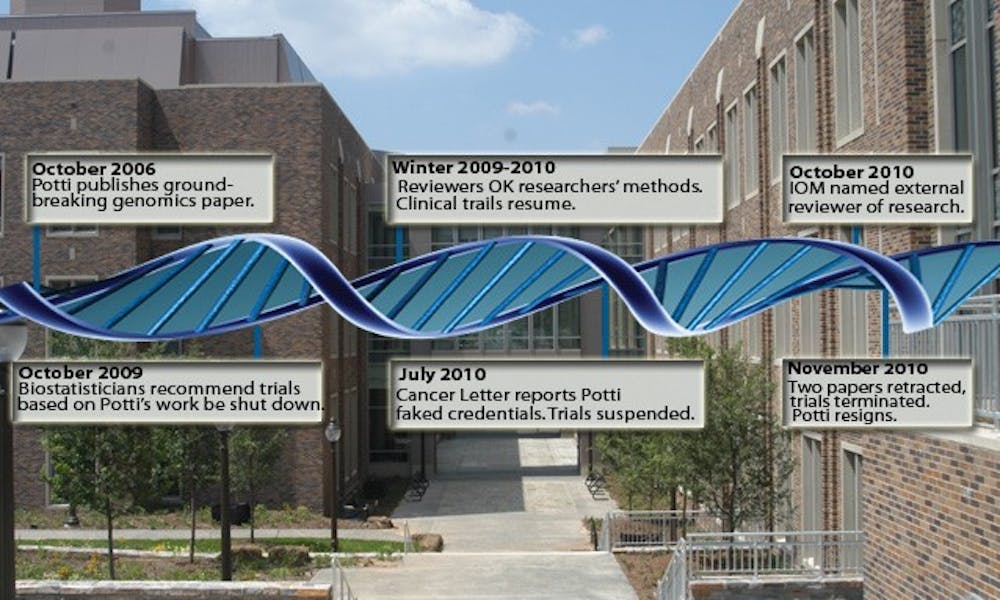The Duke cancer researcher who has been under investigation for research misconduct since this summer has resigned.
Dr. Anil Potti stepped down from his positions at Duke’s Institute for Genome Sciences and Policy and the School of Medicine Friday and took sole responsibility for the problems in his research, IGSP Director Huntington Willard said. Potti had been on paid administrative leave since July.
“This is obviously a very regrettable series of events at all kinds of levels,” Willard said in an interview with The Chronicle Friday.
Potti’s resignation comes after the termination of three clinical trials based on his research and the questioning of a number of key papers he authored. In stepping down, Potti held himself accountable for the flawed research.
“It has been a difficult time, as you might imagine,” he wrote in an e-mail to The Chronicle Friday.
Potti did not answer specific questions regarding his resignation, though he said an e-mail Willard sent to IGSP staff “summarized things well.”
“[Potti] accepted full responsibility for a series of anomalies in data handling, analysis and management that have come under scrutiny in the past months,” Willard wrote in the e-mail.
Had Potti remained at Duke, he would have faced sanctions contingent on the outcome of the research misconduct investigation including removal from the tenure track, said Dr. Michael Cuffe, DUHS vice president for medical affairs.
Willard, who was in contact with Potti as he drafted his letter of resignation, said the decision “wasn’t a real surprise.”
“I think his sense was that he could make the situation a little clearer by taking responsibility for what had happened and allowing people to begin to focus on the future,” Willard told The Chronicle. “He came to a realization that he wasn’t going to be a part of that future. Once he reached that conclusion, then resigning was the obvious thing to do.”
Potti’s resignation is not an admission of research misconduct, Willard noted, which would require that Potti made the errors intentionally or recklessly.
Both the Institute of Medicine review of Potti’s work and the Duke research misconduct investigation will continue. Officials at IOM and Duke said the investigations will not be affected by Potti’s resignation.
“We still have a lot of work to do as a university and as a medical center to bring this investigation around research misconduct and the other elements forward, whether he’s here or not,” Cuffe said. “Our focus is on the patients, it’s on the review of this foundational science and any retractions that are necessary.”
Cuffe noted that some of the grants that supported Potti’s research may need to be repaid.
Dr. Otis Brawley, chief medical officer of the American Cancer Society, said ACS is still investigating whether Potti fraudulently obtained a $729,000 grant from the society. The ACS has requested that Duke release information from its review of Potti’s credentials, which he allegedly embellished on applications for funding. On his application to ACS, Potti falsely claimed to be a Rhodes Scholar.
Brawley said the University will not be prevented from receiving future funding from ACS assuming that it adequately resolves the issue.
“If Duke behaves the way I expect Duke to behave, it will not affect our relationship,” he said. “But as I said before, it is really up to Duke to look into this and really make it right.”
Sonia Havele contributed reporting.
Get The Chronicle straight to your inbox
Signup for our weekly newsletter. Cancel at any time.

